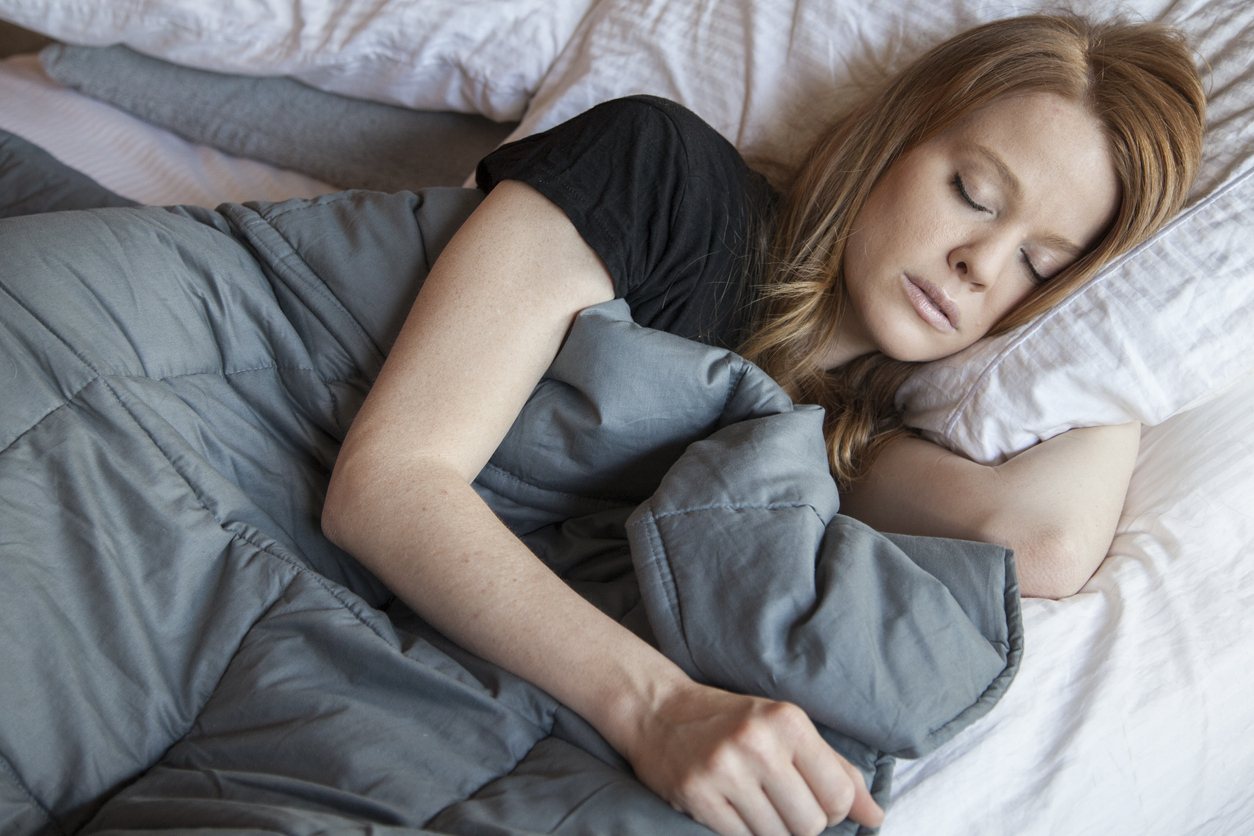If you don’t have a weighted blanket, here’s what you are missing….
Sometimes, nothing can make you feel as safe and cozy as a warm and comfy blanket. However, a few people know that a weighted blanket can be better for your health than a light fluffy cover.
A weighted blanket can not only increase your comfort but also help with insomnia, autism, anxiety, and other disruptive conditions. Thanks to that, weighted blankets are increasingly becoming a way to relieve stress and improve sleep disorders.
What exactly are weighted blankets, how are they different from their standard counterparts, and what are their advantages?
What is a Weighted Blanket, and How Does it Work?
A weighted blanket has a unique design as it weighs between five and 30 pounds, making it heavier than a regular cover. Its additional weight creates pressure that imitates pressure therapy or deep pressure stimulation, which may feel like being held or swaddled.
These soft blankets come in two different styles — duvet and knitted. The former contains ball bearings or glass or plastic beads, creating a weight that feels like a cushy hug. Meanwhile, the latter has dense yarn and a woven design.
Despite being slightly different from lighter blankets, you can use a weighted cover wherever you wish, whether on a sofa, bed, or couch. Doing so will help you feel more relaxed, as according to Cleveland Clinic, 63 percent of people are less anxious after lying under a 30-pound blanket for five minutes.
What are the Benefits of a Weighted Blanket?
Deep pressure stimulation helps people feel calmer by using controlled and gentle pressure, and weighted blankets emulate that technique. But the advantages of these covers go beyond that.
Stress and Anxiety Alleviation
A 2015 study found that weighted blankets have reduced anxiety in 30 people hospitalized for mental health crises. One of the reasons that happens is that these covers activate a person’s parasympathetic nervous system, lowering their heart rate.
Moreover, a weighted blanket can feel like a giant, pleasant hug. Often, that’s all that people need to feel better and safer.
Fight-or-flight Response Elimination
Another issue related to an agitated nervous system is that a fast heart rate, anxiety, shortness of breath, and hyperactivity trigger the fight-or-flight response. That can make people feel terrified, struggling to calm down.
Weighted blankets distribute enough pressure and weight across a person’s body to soothe them and provide a relaxing feeling. They also activate the “rest mode” and create an overall sense of tranquility.
Better Sleep Quality
Many people struggle with falling asleep and turning around in bed, whether due to stress, intrusive thoughts, or physical discomfort. In fact, sleep disorders affect over 70 million in the U.S. Some experience insomnia, while others have breathing issues and sleep disorders, such as narcolepsy.
A weighted blanket can relieve all these problems by reducing cortisol and stimulating the melatonin and serotonin hormones. While cortisol is responsible for stress, melatonin and serotonin enable sleep and boost the mood.
However, weighted blankets aren’t only for people with insomnia and similar disorders. These covers are beneficial even if you don’t have trouble falling asleep, as they increase the quality of your sleep.
A Source of Comfort and Security
Hardly anything can beat the feeling of cuddling up in your bed and covering yourself with a large, warm blanket. That often reminds us of hugging our favorite person, which brings safety and fuzzy emotions.
Weighted blankets work in a similar way, even though the gentle pressure doesn’t come from a fellow human but a cozy cover. But the result is nearly the same, as this cover makes you feel more comfortable, cared for, and safe.
Who Can Benefit from Using a Weighted Blanket?
Studies and surveys on the benefits of using a weighted blanket are still relatively recent and inconclusive. However, researchers have discovered that these covers help alleviate diverse emotional and physical symptoms.
As they provide a universal sense of calm, they can benefit everyone, including those not struggling with sleep and anxiety. However, people suffering from the following conditions may find weighted blankets more helpful than others.
Sleep Disorders
Various factors impact sleep troubles, ranging from mental conditions to asthma. But a weighted blanket can relieve all those problems in simple ways.
It adds a soft pressure that eases your breathing and slows rapid heart rate. As a result, you can calm down more easily, enabling a peaceful night and deep sleep.
Anxiety
Most people use weighted blankets to keep anxious thoughts and feelings at bay. Some therapists may even use them in treating anxiety.
That’s because these calming covers diminish autonomic arousal, which is responsible for various anxiety symptoms, including fast heart rate.
Attention Deficit Hyperactivity Disorder (ADHD)
According to a 2020 study, weighted blankets are a safe and effective intervention for patients struggling with ADHD. Another study conducted in 2014 examined the use of weighted vests in ADHD therapy and found that they helped decrease hyperactive moments and enhance attention.
Autism
People with autism exhibit various behaviors and characteristics, including insomnia, especially kids. Since a 2017 study found that deep pressure therapy (e.g., squeezing and massage) can benefit autistic people, weighted blankets may have the same positive effect.
Osteoarthritis
Even though no research studies examined whether weighted blankets are advantageous in treating osteoarthritis, a 2017 qualitative study used massage therapy, which may be a good indicator.
According to that study, 18 participants suffering from osteoarthritis experienced less knee pain after receiving massage therapy for eight weeks. It’s possible that using weighted blankets consistently could help in a similar way due to providing gentle pressure to the joints.
How Safe are Weighted Blankets?
Although generally safe, weighted blankets can be heavy, requiring sufficient physical ability and strength to lift them. Otherwise, in rare cases, a person may feel entrapped or as if they were suffocating.
For the same reason, people with medical conditions such as claustrophobia and chronic respiratory issues should consider lighter cover. Moreover, weighted blankets could also slightly restrict airflow, so those with obstructive sleep apnea (OSA) should consider avoiding them.
Parents should favor a less heavy cover for their children to eliminate the risk of entrapment and weighted blankets should never be used for infants.
Here’s a run-down of the best weighted blankets:
- 1) BETU Weighted Blanket for Adults – Cooling and Breathable Heavy Blanket with Premium Glass Beads – Soft Thick Blanket for All-Season Sleeping Comfort – Multiple Colors;
- 2)Bearaby Hand-Knit Weighted Blanket for Adults – Chunky Knit Blanket – Sustainable, Breathable, Organic – Machine Washable for Easy Maintenance (Moonstone Grey, 15 lbs);
- 3) Bare Home Weighted Blanket for Adults 30lb (80″ x 87″) – All-Natural 100% Cotton – Premium Heavy Blanket Nontoxic Glass Beads (16 Colors, 80″x87″);
- 4) Royal Therapy Weighted Blanket – Heavy 100% Cotton Blankets with Premium Glass Beads (60”x80” 15lbs, Royal Grey), Suitable for One Person (~150lb) – Use on Queen/King Bed
- 5) Yescool Weighted Blanket for Kids 5 Pounds (36″x48″, 5lbs) Childrens Cooling Weighted Lap Blanket, Toddler Heavy Blanket for Sleeping, Weighted Throw Blanket Perfect for 40-60lbs, White Coconut



